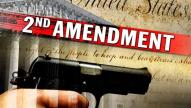THE RIGHT TO BEAR ARMS MEETS NEW REGULATIONS
According to a 2012 poll, nearly one half of all Americans keep a firearm in their home. Many of them may be weapons subject to registration under the National Firearms Act (NFA). These weapons, which include machine guns, suppressors (silencers), short-barreled (sawed off) shotguns and destructive devices (howitzers, mortars, grenade launchers, etc.) are referred to as Type II weapons as they fall under that Article of the NFA.
The NFA, enacted in 1934, restricts the possession and transfer of Type II weapons and violation of the terms of the NFA can lead to fines of up to $250,000 and up to ten years imprisonment. In addition to the NFA the Gun Control Act of 1968 (GCA) and the Firearm’s Protection Act (FOPA) also affect the rights of owners of Type II weapons, especially machine guns.
So, you might be asking, what does this have to do with estate planning? If you are an executor, trustee or personal representative of an estate or a common trust instrument, the proper ownership of Type II weapons could prevent the imposition of fines or imprisonment of the personal representative or the heirs or beneficiaries.
Transfer of a Title II firearm requires a strict adherence to the necessary steps to transfer these items. These steps are set forth in Chapter 9 of the NFA Handbook. The NFA Handbook is not available in a printed version and can be accessed at www.atf.gov/firearms/national-firearms-act-handbook.
If the weapon is registered in the National Firearm Register and Transfer Record, the transfer provisions of the NFA apply. If the weapon is not registered, transferring, possessing or receiving a Type II weapon is a criminal act. This is a particularly harsh result for a personal representative who must deal with the Type II weapons. Additionally, the Doctrine of Constructive Possession may put the surviving spouse or members of the decedent’s family at risk, as only the individual who owns the weapon may possess the weapon. Any unregistered firearms should not be transferred or taken into custody by the personal representative, but should be turned over to law enforcement. Retroactive registration to the estate does not appear to be an option.
What is the solution? The creation of a valid gun trust may be the best way to deal with ownership and eventual transfer of Type II weapons. The NFA defines “individual” to include trusts, and because it is lawful to transfer a registered Type II weapon to an individual, it logically follows that the same weapon may be transferred to a trust, referred to as a “gun trust”. A well drafted gun trust will give important guidance to the trustee and the beneficiaries so as to avoid violation of the NFA.
Some of the benefits of the gun trust include ease of administration, the ability of the trustee, no matter who it might be, to possess the weapons, and avoidance of probate as to the weapons.
According to Professor Gerry W. Beyer,
An NFA gun trust must include the following information to determine necessary actions to ensure proper transfer upon death or incapacity:
Whether it is permissible in the jurisdiction to transfer the items.
Whether the items are legal in the state to where they will be transferred.
Whether the beneficiary is legally able to be in possession or use of the items.
Whether the successor trustee is given the ability to determine if the beneficiary is mature and responsible enough to have control of the firearms. See, Target Best Practices for Guns Included in an Estate, Estate Planning Journal (WG&L), Volume 3, Number 03, March, 2016.
With a properly drafted gun trust, transfer of the trust transfers the use and possession of the weapon without violating the provisions of the NFA since the weapon itself was not transferred. Since every Trustee can legally use an operate a Type II firearm, the gun trust provides a safe harbor for these regulated firearms, and allows the passage of Type II firearms without additional registration with the government.
Be aware that new Gun Trust regulations take effect on July 13, 2016. After that date each Trustee will be required to submit to a background check, submit fingerprints and notify local law enforcement of the acquisition of Type II firearms. Establishing a gun trust and submitting the transfer application prior to July 13 should avoid these new registration requirements.
Gun trusts can be an important tool to protect your Second Amendment rights to bear arms, but it could be a more important tool to protect you family and personal representative from onerous fines, imprisonment and the confiscation of the firearms. Estate Planners should raise these issues with clients and determine whether there is a monster hiding in the gun cabinet.
Posted in: Estate Planning, Gun Trusts, Veterans

